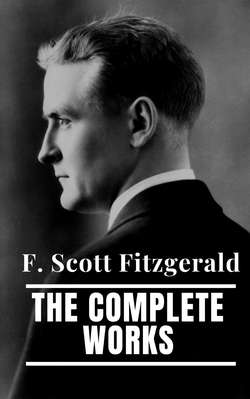Читать книгу The Complete Works of F. Scott Fitzgerald - F. Scott Fitzgerald - Страница 207
На сайте Литреса книга снята с продажи.
II
ОглавлениеBy 10 p.m. Mr. Bill Driscoll was usually weary, for by that time he had a full twelve-hour day behind him. After that he only went out with the most celebrated people. If someone had tipped off a multi-millionaire or a moving-picture director—at that time American directors were swarming over Europe looking for new locations—about Bill Driscoll, he would fortify himself with two cups of coffee, adorn his person with his new dinner coat and show them the most dangerous dives of Montmartre in the very safest way.
Bill Driscoll looked good in his new dinner coat, with his reddish brown hair soaked in water and slicked back from his attractive forehead. Often he regarded himself admiringly in the mirror, for it was the first dinner coat he had ever owned. He had earned it himself, with his wits, as he had earned the swelling packet of American bonds which awaited him in a New York bank. If you have been in Paris during the past two years you must have seen his large white auto-bus with the provoking legend on the side:
WILLIAM DRISCOLL
he shows you things not in the guidebook
When he found Milly Cooley it was after three o’clock and he had just left Director and Mrs. Claude Peebles at their hotel after escorting them to those celebrated apache dens, Zelli’s and Le Rat Mort (which are about as dangerous, all things considered, as the Biltmore Hotel at noon), and he was walking homeward toward his pension on the Left Bank. His eye was caught by two disreputable-looking parties under the lamp post who were giving aid to what was apparently a drunken girl. Bill Driscoll decided to cross the street—he was aware of the tender affection which the French police bore toward embattled Americans, and he made a point of keeping out of trouble. Just at that moment Milly’s subconscious self came to her aid and she called out “Let me go!” in an agonized moan.
The moan had a Brooklyn accent. It was a Brooklyn moan.
Driscoll altered his course uneasily and, approaching the group, asked politely what was the matter, whereat one of the disreputable parties desisted in his attempt to open Milly’s tightly clasped left hand.
The man answered quickly that she had fainted. He and his friend were assisting her to the gendarmerie. They loosened their hold on her and she collapsed gently to the ground.
Bill came closer and bent over her, being careful to choose a position where neither man was behind him. He saw a young, frightened face that was drained now of the color it possessed by day.
“Where did you find her?” he inquired in French.
“Here. Just now. She looked to be so tired—”
Bill put his hand in his pocket and when he spoke he tried very hard to suggest by his voice that he had a revolver there.
“She is American,” he said. “You leave her to me.”
The man made a gesture of acquiescence and took a step backward, his hand going with a natural movement to his coat as if he intended buttoning it. He was watching Bill’s right hand, the one in his coat-pocket, and Bill happened to be left-handed. There is nothing much faster than an untelegraphed left-hand blow—this one traveled less than eighteen inches and the recipient staggered back against a lamp post, embraced it transiently and regretfully and settled to the ground. Nevertheless Bill Driscoll’s successful career might have ended there, ended with the strong shout of “Voleurs!” which he raised into the Paris night, had the other man had a gun. The other man indicated that he had no gun by retreating ten yards down the street. His prostrate companion moved slightly on the sidewalk and, taking a step toward him, Bill drew back his foot and kicked him full in the head as a football player kicks a goal from placement. It was not a pretty gesture, but he had remembered that he was wearing his new dinner coat and he didn’t want to wrestle on the ground for the piece of poisonous hardware.
In a moment two gendarmes in a great hurry came running down the moonlit street.
